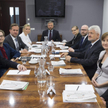According to Collins Dictionary, „single-use” was considered the most popular word in the UK in 2018. The adjective made a career thanks to imaginative images of polluted oceans, garbage islands and fish with plastic inside. It has become synonymous with the harmful effects of civilisation as well as bad consumption and production models that dramatically change ecosystems, have catastrophic environmental and climate impacts with dangerous economic and social consequences.
But there is another reason for the popularity of the term “single-use”. This is a move away from one-offs. Resignation from e.g. plastic straws and other disposable products. The process of changing the existing models, the development of circular economy, the economy of sharing and the emergence of new models that allow to reconcile environmental, economic and social objectives in a response to climate challenges.
The crucial 1,5 s. C
Discussions about global opportunities and climate-related challenges will take place this year for the third time in Poland. One of the most frequently cited documents will certainly be a publication that appeared in the first days of October. The report was prepared by nearly 100 experts, on the basis of several thousand works, taking into account tens of thousands of comments from experts and government representatives. It shows the actions necessary to limit the increase in temperatures to 1.5 degrees Celsius (no longer 2 degrees Celsius, as previously proposed) and to protect the Earth from the potentially catastrophic effects of climate change. These changes, which have a very real impact on people’s lives for environmental reasons, also have negative social and economic effects. They are linked to migration, conflicts caused by droughts, floods, fires or, for example, diseases caused by poor air quality.
It is the social and economic consequences and climate change scenarios that are an important part of the IPCC (Intergovernmental Panel on Climate Change) report to be used in the implementation of Agenda 2030. The SDG report that Poland submitted to the UN in July shows in a comprehensive way where we are in relation to each of the UN Sustainable Development Goals (SDGs).























